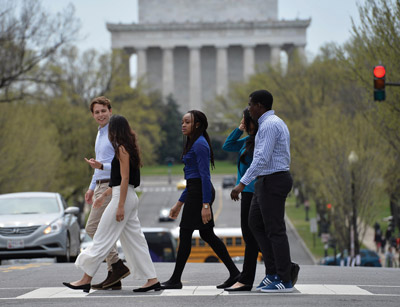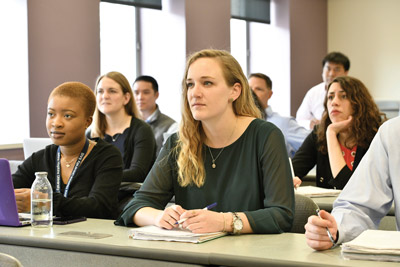2020 Leaders in Graduate Education
THIS GUIDE IS NO LONGER ACTIVE. For the current FP Guide, click here.
Johannes Urpelainen, Prince Sultan bin Abdulaziz Professor of Energy, Resources, and Environment
Johns Hopkins School of Advanced International Studies
Johannes Urpelainen, a top energy policy expert who advises governments, international organizations, and the private sector, aims to teach “action-oriented” classes. As director of the Energy, Resources, and Environment program at the Johns Hopkins School of Advanced International Studies (SAIS), he led a redesign of the program last year, so that students begin with a broad introductory class and then move on to more specialized courses.
 “I try to get our students to think about concrete problems and how to go about systematically solving them,” explains Urpelainen, Prince Sultan bin Abdulaziz professor. Exercises could include writing policy briefs, memos, or research papers that are “built around addressing a practical problem in a realistic and feasible way.”
“I try to get our students to think about concrete problems and how to go about systematically solving them,” explains Urpelainen, Prince Sultan bin Abdulaziz professor. Exercises could include writing policy briefs, memos, or research papers that are “built around addressing a practical problem in a realistic and feasible way.”
In a class last year on energy access, the assignment was to select a country that has trouble providing energy to its population because of, say, a shortage of reliable electricity or insufficient access to clean cooking fuel. “I asked the students to come up with some concrete recommendations for how the government could address the situation,” says Urpelainen. “So instead of keeping it at a high theoretical level, I made it very concrete.”

“I try to get our students to think about concrete problems and how to go about systematically solving them.” –Johannes Urpelainen, Prince Sultan bin Abdulaziz Professor of Energy, Resources, and Environment, School of Advanced International Studies, Johns Hopkins University
One student conducted research to understand why the government of Angola had not succeeded with its policies for using solar power to improve energy access in rural areas. The result was “a terrific analysis of the institutional limitations of Angola’s energy policy system,” says Urpelainen. The student wrote a blog post based on that analysis, and it was featured on the website of the 200,000-member Energy Central Power Industry Network.
 There are 40 to 50 students enrolled each year in the Energy, Resources, and Environment program, and they can study at any of the school’s three campuses—in Washington, DC; Bologna, Italy; and Nanjing, China. All three locations offer the same introductory course, to provide a common foundation. Mirroring the overall approach of Johns Hopkins SAIS, the program is interdisciplinary, bringing together elements of science and technology, economics, and politics and governance.
There are 40 to 50 students enrolled each year in the Energy, Resources, and Environment program, and they can study at any of the school’s three campuses—in Washington, DC; Bologna, Italy; and Nanjing, China. All three locations offer the same introductory course, to provide a common foundation. Mirroring the overall approach of Johns Hopkins SAIS, the program is interdisciplinary, bringing together elements of science and technology, economics, and politics and governance.
Students gain experience working on projects for major corporate clients, such as BP, ExxonMobil, Google, and Tesla. In Washington, students benefit from the proximity of US government institutions, the World Bank Group, and the International Monetary Fund—all within walking distance.
“That creates all kinds of opportunities for our students, in terms of networking and practical experience,” Urpelainen says.
Urpelainen also is founding director of the school’s Initiative for Sustainable Energy Policy, which involves faculty and students in practical work on energy and the environment in emerging economies. Started two years ago, ISEP is generating support from foundations, mostly based in the United States and Europe, such as the Stichting SED Fund in the Netherlands. One effort is focused on helping India transition from coal to renewable sources, by working with civil-society organizations to conduct research and develop recommendations for the government.
“The civil-society and government partnerships that we have in India are quite deep,” Urpelainen says. “So, they give us a good opportunity to influence policy in a positive way.”
Graduate Degree Program Options
- Master of Arts (MA)
- MA in European Public Policy
- MA in Global Policy (for experienced professionals)
- MA in Global Risk
- MA in International Affairs (MAIA)
- MA in International Economics and Finance
- MA in International Studies
- Master of International Public Policy (for experienced professionals)
- Diploma in International Studies
- Doctor of International Affairs
- Doctor of Philosophy (PhD)
- Certificate in Chinese and American Studies
- Certificate in Chinese and American Studies + MA
- Certificate in Chinese and American Studies + MAIA
- Certificates in International Studies, International Development, and International Economics (full-time and part-time study)
The school also offers dual and cooperative degree programs.
Visit the Request Info page to receive more information.
Contents
- 2020 Leaders in Graduate Education
- Johns Hopkins School of Advanced International Studies
- UC San Diego, School of Global Policy and Strategy
- Indiana University, Hamilton Lugar School of Global and International Studies
- NYU School of Professional Studies, Center for Global Affairs
- Tufts University, The Fletcher School
- University of Kent, Brussels School of International Studies
- Columbia University, School of International and Public Affairs (SIPA)
- University of Texas at Austin, LBJ School of Public Affairs

